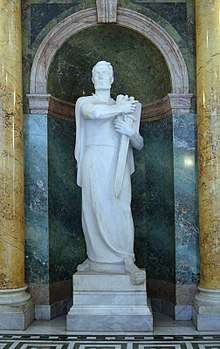Kocel

Kocel[a] (fl. 861–874) was a Slavic ruler of Lower Pannonia, a polity known in historiography as the Balaton principality. He was an East Frankish vassal titled comes (count), and is believed to have ruled between 861 or 864 and 876.
Life
Kocel was the son of Pribina, a Slavic dux installed by the Franks in Lower Pannonia in ca. 838[1] or 840.[2] Bowlus believes he was born in ca. 820.[1] In 861, Kocel made a significant donation to the Freising monastery, showing that he had a solid social and political standing.[3] According to Bowlus, this document indicates that Pribina had died, and Kocel succeeded him.[4] Louis the German installed Kocel as a ruler in Lower Pannonia in 864.[5] Kocel held "Lower Pannonia" (Pannonia inferioris) in 865, when Archbishop Adalwin of Salzburg visited his lands twice.[6] In 869, Kocel had requested for Byzantine missionary Methodius to be sent into Pannonia as a papal legate.[7] In midsummer, Kocel sent Methodius to Rome with twenty men to petition for his elevation to bishop.[7] Hadrian II appointed Methodius the archbishop of Sirmium, and sent confirmations to, among others, Kocel, whose land lay within the jurisdiction.[8] Frankish Pannonia was held by Kocel and Bavarian margraves in 871; Kocel enjoyed independence, as evident from his talks with the pope.[9] In 874, following the Moravian conflict, Kocel continued to rule the Drava Valley, presumably under Carloman of the March of Pannonia.[7] Kocel disappears from sources after 874,[1] and was either dead or removed from his office in ca. 876,[10] certainly dead by 880.[11]
Titles
Annotations
- ^ He is known from Bavarian and Papal documents mostly as Chozil, Chezil, Chezul, and Gozil.[3] Conversio Bagoariorum et Carantanorum uses Chozil, Chezil, and Chezilo.[13] The most used rendering is Kocel. His name is also spellt Koceľ in Slovak,[14] Kocelj (Коцељ) in Slovenian and Serbo-Croatian,[15] and Kotzeles in Greek.[15]
References
- 1 2 3 Bowlus 1995, p. 203.
- ↑ Bowlus 1995, p. 325.
- 1 2 3 Hellēnikē Hetaireia Slavikōn Meletōn 1999, p. 92.
- ↑ Bowlus 1995, p. 139.
- ↑ Goldberg 2006, pp. 273–274.
- ↑ Bowlus 1995, p. 156.
- 1 2 3 Bowlus 1995, p. 184.
- ↑ Bowlus 1995, p. 185.
- ↑ Bowlus 1995, p. 176.
- ↑ Bowlus 1995, p. 201.
- ↑ Bowlus 1995, p. 192.
- ↑ Bowlus 1995, p. 207.
- ↑ John Tuzson (2002). István II (1116-1131): A Chapter in Medieval Hungarian History. East Europe Monographs. p. 12. ISBN 978-0-88033-500-3.
- ↑ Elena Mannová (2000). Studia Historica Slovaca. 21. Historický ústav SAV. p. 23. ISBN 978-80-88880-42-4.
- 1 2 Vatroslav Jagić (1866). Književnik. Brzotiskom Dragutina Albrechta. pp. 100–.
Sources
- Bowlus, Charles R. (1995). Franks, Moravians, and Magyars: The Struggle for the Middle Danube, 788-907. University of Pennsylvania Press. ISBN 978-0-8122-3276-9.
- Goldberg, Eric Joseph (2006). Struggle for Empire: Kingship and Conflict Under Louis the German, 817-876. Cornell University Press. ISBN 0-8014-3890-X.
- Hellēnikē Hetaireia Slavikōn Meletōn (1999). Thessaloniki, Magna Moravia: proceedings of the International conference, Thessaloniki, 16-19 october 1997. Hellenic Association for Slavic Studies. p. 92.